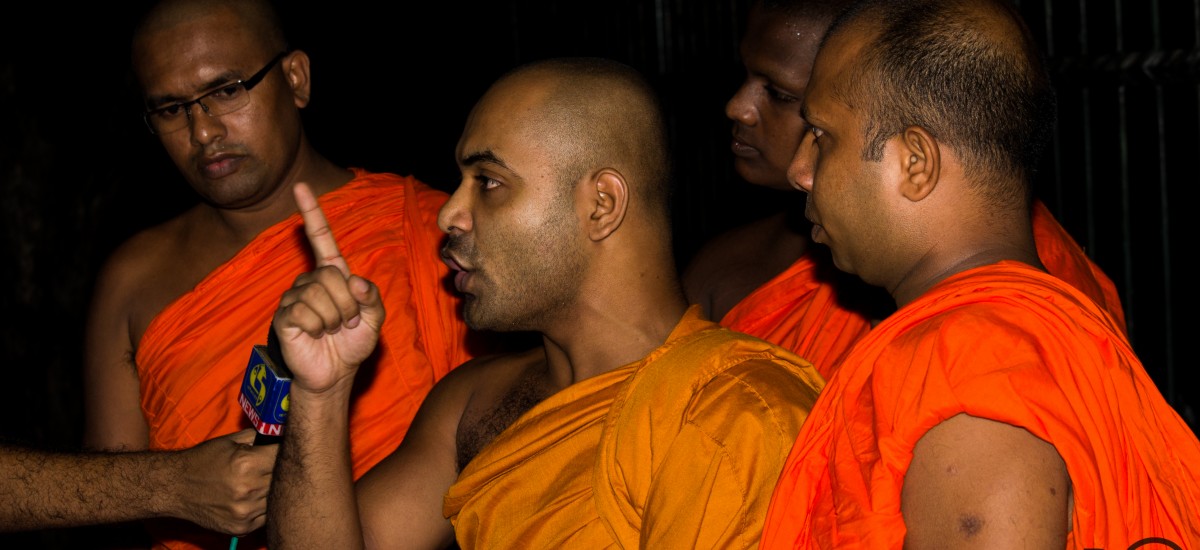Sri Lankan society is being divided and systematically targeted as the racism juggernaut continues to gain momentum around the country. Minorities face growing persecution with nationalist groups sprouting up and feeding on the insecurities and economic decline of the nation.
The Bodu Bala Sena (BBS) was the first organised group to rise up and openly target minorities, namely the Muslims and Evangelicals. As their racist and unopposed crusades continue other more radical groups are forming such as the Sinhala Ravaya, who was credited with the recent attack on the Muslim run Fashion Bug outlet in Pepiliyana.
Last Friday (12) open opposition to the BBS and its offshoot nationalist groups was staged with a candlelit vigil. Unfortunately it was only minutes until state intervention arose on behalf of the nationalists with the arrests and dispersal of the protesters. The police spokesperson, G.M.H.B. Siriwardena, was only able to say that the protesters had not acquired the proper approval to stage a gathering and as such the police had been forced to take action.
The Bodu Bala Sena has another story as the “venerable” Saravasiri explained that they had called the police as the protesters were allegedly singing a new national anthem and as such should be branded as traitors to the nation and arrested. He then went on to explain that had the protesters called for discussions ahead of holding a public demonstration, the BBS would have welcomed them. He added that they were forced to call the police when they learnt that Muslims were also taking part in the demonstration.
While opposition from the group to this vigil was expected, the efficient display by the police in cracking down on such a demonstration begs the question as to who they supported. Police on the scene explained that they were acting in response to a complaint made against the protesters. Incidentally, the protest was planned for 7pm and it was by 7.15pm that the police had arrived and were in the process of making arrests.
While the argument would be made in favour of the efficiency of the police in responding to a complaint, the question must then be posed as to why they have failed to take action on the numerous occasions that these nationalist groups have attacked shops and mosques. The police spokesperson defended their actions saying they were within the law as those organising the vigil had not got a permit. However, he was unable to confirm whether or not BBS or any other of the nationalist groups had acquired permits before demonstrating and subsequently attacking Muslim owned shops.
While it is becoming clear that opposition to the rising nationalism in Sri Lanka is facing barriers from both the state and the nationalists themselves, the need for opposition is great. Friday’s incident was just a brief insight in to the growing influence the nationalist groups hold in the country.
Those who turned up for the vigil on Friday should be applauded but also reminded that it is not over while others must be encouraged to join the cause. BBS and other such nationalist groups, with the assistance of those under the guise of saffron robed monks, are spreading nationalist sentiment far and wide. Misinformation, propaganda and intimidation are tools of their trade.
However, those who wish to promote the idea of a diverse society will need to take an immediate stand. This can only be done through the reinforming of those around them about the dangers of such a rise in nationalism. While the nationalists claim certain actions by minority groups are holding the country back from prospering, it is ironically the growing racial tension that is the cause.
Economically, internationally and culturally Sri Lanka has only to lose if this rising racism continues to go unabated. Those who are considered Sri Lanka’s allies will distance themselves, while critics of the country will only have more fuel to add to the fire. Sri Lanka’s economy is as much driven by the minorities as it is by the Sinhalese, a shift in this balance will only serve to deplete an already weakened economic situation. While culturally Sri Lanka has prided itself on a diverse society, the racial conflict can only disperse what is now becoming a false notion.
While vigils such as the one on Friday are necessary, they will need to be boosted with the assistance of members of the clergy. Religion is pivotal in influencing the trend of thought of Sri Lankan society; as such it will be necessary to ensure a united front both religiously and racially in opposing the nationalists.
Sri Lanka now faces an uphill task in dislodging the racist sentiment that is slowly creeping in to society. However, it is clear that if the country wishes to prosper, racial unity and diversity is a must. The United States was only truly considered a world superpower once it had broken down the racial barriers that left its society divided and conflicted. Similarly Sri Lanka’s bid to become a post-war success story can only be accomplished once these barriers are removed.





